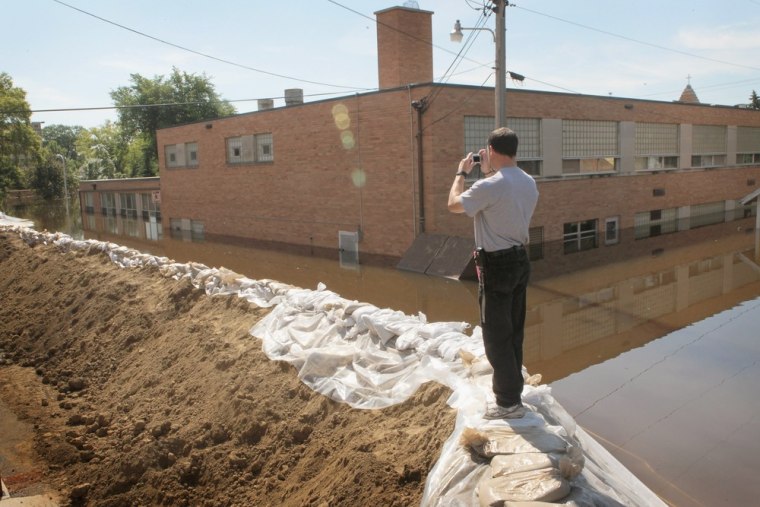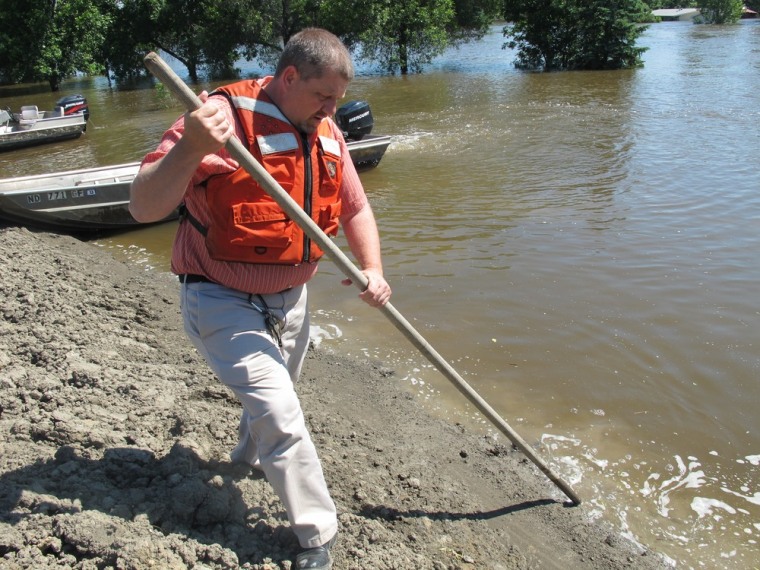Soon-to-be superintendent Mark Vollmer walked gingerly atop an earthen dike shielding Perkett Elementary School from swirling, 9-foot-deep floodwaters and poked a long wooden pole into its base, searching for signs of wear.
Fortunately, the barrier — quickly built from playground soil last week as the rain-choked Souris River bore down on the little brick schoolhouse — appeared to be holding fast.
It was a bright spot in an otherwise grim picture for Minot's public education leaders, who must decide soon where to put more than 1,000 elementary and middle-school students whose buildings probably will be unfit for occupancy this fall. The flood also swamped 4,100 homes and hundreds of businesses.
"We've got some long days ahead of us," said Vollmer, 45, who officially starts his new job Friday after serving as the North Dakota district's high school principal for the past six years. "But we'll rebuild our homes and rebuild our schools and rebuild our lives and we'll make it."
Two of the district's elementary schools are believed to have severe water damage, and a middle school is submerged to the roofline. Together, they account for 1,028 students, about 15 percent of the district's total enrollment. Another elementary school with 281 pupils had a sewage backup in the basement but has been pumped out and appears in good shape.
Perkett Elementary, where 248 children attend, is dry for now, though it resembled a vulnerable island as Vollmer and other officials inspected the dike this week. The residential neighborhood where the school is located had become a lake, its waters so deep that only the upper portions of houses were visible. Road signs and basketball goals peeked a foot or two above the surface.
"About a month ago, I was umpiring baseball games out here," social studies teacher Steve Dangel said as the motorboat he and Vollmer took to reach Perkett rumbled past a nearby park. "Now you can't even see the outfield wall."
Dangel, 32, had been scheduled to transfer from the high school to Ramstad Middle School this fall. His wife, Angie, teaches second grade at Longfellow Elementary, one of the schools with severe water damage. She hauled three truckloads of supplies from her classroom just in time.
"I really don't know how much water is in the room and I really won't know what to think until I walk in and see the mess," she said.
Also flooded was the Little Flower Elementary, a Catholic school with 170 pupils in preschool through fifth grade, as a last-minute sandbagging effort fell short.
Superintendent Terry Voiles said the brick and terrazzo structure may have fended off major structural damage but is unlikely to be ready when classes resume Aug. 17. Its students probably will be shifted to a Catholic high school outside the danger zone.

Flooding is nothing new in the Souris Valley. The Army Corps of Engineers and a local contractor placed dikes around schools a month ago when it appeared the river would overflow after a heavy storm. But everyone was caught off guard by last week's deluge, the worst on record.
Vollmer said school officials were notified June 20 that a 7-inch rainstorm in Canada, about 60 miles north, was sending a gigantic surge of water downstream. They raced to shore up the existing dikes and build new ones to protect schools in low-lying areas. Ironically, a dike that had been erected around Lincoln Elementary during the earlier scare was removed when it appeared the threat had passed. Last week, there was no time to rebuild it and the school now has severe water damage.
Ramstad Middle School's dike was raised to the roofline, but it wasn't high enough.
As the crisis worsened Friday night, workers struggled to save Longfellow, where synthetic barriers thrown up by the National Guard were no match for the water that soaked through sewage drains and the porous soil.
"The water was coming right up through the ground," Vollmer said. "We'd plug one spot and we'd lose another spot. We just couldn't stay ahead of it."

At Perkett, heavy equipment operators scraped up soil from the playground to form a protective wall. When one portion weakened, the National Guard dropped 83 giant sandbags from a helicopter.
During an aerial tour Sunday, Vollmer said, the extent of the damage hit home. "I can't even think of a word to describe the devastation," he said.
As the river crested over the weekend and began a slow retreat, school officials turned their attention to the academic year that begins in less than two months. Gov. Jack Dalrymple says he'll appoint a task force to help with planning.
Until the waters recede and inspectors can tour the buildings, it won't be clear how much work they will need, Vollmer said. But it's all but certain that Longfellow and Lincoln elementary schools and Ramstad middle school will be out of commission. Carpets will have to be removed and there may be electrical and structural damage. The buildings will have to be thoroughly scrubbed.
Among the options are moving the students into undamaged school buildings, acquiring portable classrooms and holding classes in other vacant locations. The district's schools were already packed because of population growth fueled by an oil boom in the area, although some children of flooded-out families might not return this fall, Vollmer said.
Most textbooks and computers were rescued. But desks, filing cabinets and other equipment will have to be replaced. Teachers may have lost lesson plans and supplies.
The price tag is unknown. Another financial concern: The inundated homes will have less taxable value. About 30 percent of the public school budget is generated by local property taxes.
Despite everything, parents and school officials remain mostly upbeat.
Julie Kudrna, who has one child at Longfellow and another at Ramstad, said her family — including the kids — will volunteer to help with the cleanup.
"It's going to be one of those years they will grow as little people and take a big step into maturity," Kudrna said. "The life lessons they will learn from this are something you can't learn in a book."